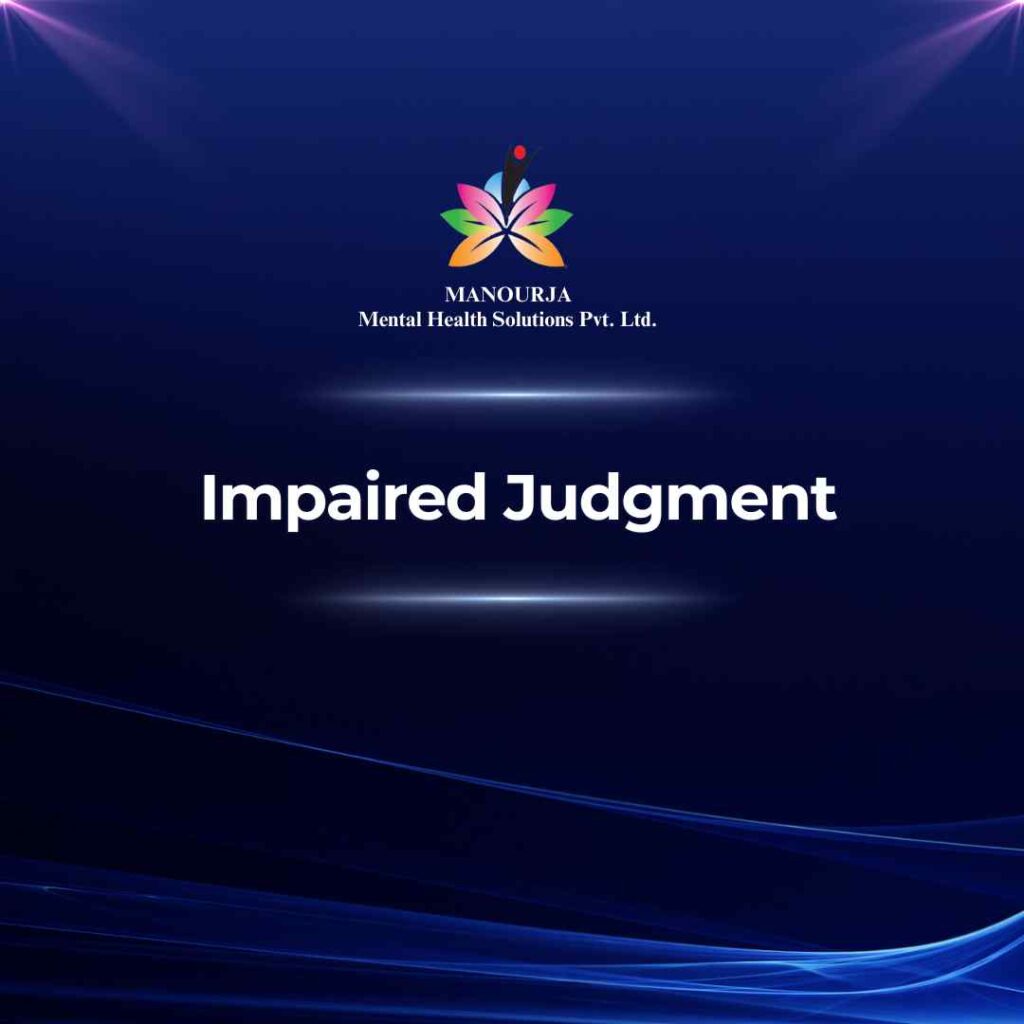Impaired Judgment

Impaired judgment in the context of mental illness refers to a diminished ability to make sound and rational decisions. It is a significant symptom across various psychiatric disorders where individuals may struggle to assess situations accurately, evaluate risks appropriately, or make choices that align with their best interests or societal norms.
- Poor Decision-Making: Individuals with impaired judgment may make choices that are reckless, impulsive, or inappropriate given the circumstances. For example, spending money excessively during a manic episode in bipolar disorder.
- Inability to Assess Consequences: They may have difficulty foreseeing the potential outcomes or implications of their actions, leading to behaviors that endanger themselves or others.
- Lack of Insight: Similar to impaired insight, there can be a failure to recognize the severity of a situation or the need for intervention, such as refusing necessary medical treatment.
- Social and Occupational Impairment: Impaired judgment can affect personal relationships and work performance, as decisions may lead to conflicts, legal issues, or financial problems.
Mental Illnesses Associated with Impaired Judgment
Impaired judgment can manifest in several mental health conditions, including:
- Bipolar Disorder: During manic episodes, individuals may exhibit impulsivity and poor judgment, such as engaging in risky behaviors or making grandiose plans without consideration of consequences.
- Schizophrenia: Cognitive deficits associated with schizophrenia can impair judgment, affecting an individual’s ability to assess reality or make logical decisions.
- Substance Use Disorders: Drugs and alcohol can impair cognitive functions, including judgment, leading to substance-seeking behaviors despite negative consequences.
- Frontotemporal Dementia: This neurological condition can lead to changes in personality and behavior, including impaired judgment due to damage in the frontal and temporal lobes of the brain.
- Traumatic Brain Injury: Depending on the area of the brain affected, injuries can lead to impaired decision-making abilities.
Diagnosis and Treatment
Diagnosing impaired judgment involves clinical evaluation by mental health professionals, often through interviews, cognitive assessments, and observation of behavior. Treatment approaches may include:
- Psychotherapy: Cognitive-behavioral therapy (CBT) and other therapeutic modalities can help individuals recognize and address irrational thoughts and behaviors.
- Medication: Depending on the underlying condition, medications may be prescribed to manage symptoms and improve cognitive functions.
- Supportive Interventions: Educating individuals and their families about the effects of impaired judgment and providing guidance on making safer decisions.
- Environmental Modifications: Creating structured routines and minimizing environmental triggers that can exacerbate poor judgment.
Conclusion
Impaired judgment is a critical symptom in various mental health disorders that requires careful assessment and targeted intervention. By addressing underlying conditions and providing appropriate support, individuals can improve their decision-making abilities and enhance their overall quality of life.
At MANOURJA, we believe in the transformative power of counseling. Our experienced therapists offer a safe and supportive space where you can explore your thoughts, emotions, and challenges. Through personalized counselling sessions, we’ll work together to develop coping strategies, build resilience, and achieve lasting positive change. Discover the path to a healthier, happier you with MANOURJA counselling services.
MANOURJA Rehabilitation Services
At MANOURJA, we’re dedicated to helping you in rebuild your life, after difficult times. Our rehabilitation services focus on understanding what you need to move forward, whether you’re recovering from addiction, trauma, or any psychological – social challenges. We create personalized plans, that are all about helping you, regain your strength and find hope again. With a caring team by your side, you’ll have the support to make real progress and take steps toward a brighter, healthier future.
